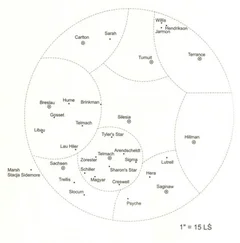David Weber - More Than Honor
Здесь есть возможность читать онлайн «David Weber - More Than Honor» весь текст электронной книги совершенно бесплатно (целиком полную версию без сокращений). В некоторых случаях можно слушать аудио, скачать через торрент в формате fb2 и присутствует краткое содержание. Жанр: Фантастика и фэнтези, на английском языке. Описание произведения, (предисловие) а так же отзывы посетителей доступны на портале библиотеки ЛибКат.
- Название:More Than Honor
- Автор:
- Жанр:
- Год:неизвестен
- ISBN:нет данных
- Рейтинг книги:3 / 5. Голосов: 1
-
Избранное:Добавить в избранное
- Отзывы:
-
Ваша оценка:
- 60
- 1
- 2
- 3
- 4
- 5
More Than Honor: краткое содержание, описание и аннотация
Предлагаем к чтению аннотацию, описание, краткое содержание или предисловие (зависит от того, что написал сам автор книги «More Than Honor»). Если вы не нашли необходимую информацию о книге — напишите в комментариях, мы постараемся отыскать её.
More Than Honor — читать онлайн бесплатно полную книгу (весь текст) целиком
Ниже представлен текст книги, разбитый по страницам. Система сохранения места последней прочитанной страницы, позволяет с удобством читать онлайн бесплатно книгу «More Than Honor», без необходимости каждый раз заново искать на чём Вы остановились. Поставьте закладку, и сможете в любой момент перейти на страницу, на которой закончили чтение.
Интервал:
Закладка:
The most important junction not to pass under League control is the Manticore Junction. Historically, Manticore has enjoyed congenial relations with the League but has no desire to submerge itself within the League's bureaucracy, and the combination of the revenues generated by the junction and the sturdily independent, continually growing population of its three worlds make the League's traditional incentives less attractive to the Manticorans than to most struggling colonies. In the last thirty years, however, an undeniable edge of strain has crept into League-Manticoran relations due to the looming conflict with the People's Republic. The one thing the Star Kingdom most fears is a situation in which the Peeps would be able to purchase advanced technology from the League, thus redressing their tactical inferiority vis-a-vis the Royal Navy. In its efforts to prevent that situation from arising, the Cromarty Government was forced to resort to strong-arm economic pressure to get a technology embargo out of the Executive Council. The effort succeeded, but at the result of strained relations.
Although the Haven System lies 667 light-years from Old Earth, 155 light-years further distant than Manticore, the first shuttle landed on its habitable planet (also called Haven) in 1309 pd, over a century before Manticore was settled. This was possible because of the fashion in which the introduction of the Warshawski Sail had revolutionized the logistics of colonization. Haven's day is 24.56 standard hours in length, and its year is 412.25 local days in length, divided into 13 months: 9 of 32 days each and 4 of 31 days each. The short months are the 3rd, 5th, 10th, and 12th. Every 4 years, the 3rd month is 32 days long.
Haven lay in a particularly attractive region, with an unusually high proportion of F, G, and K class stars, and the original expedition was extremely well financed as a joint venture by no fewer than eleven corporations based on member planets of the Solarian League. Moreover, the planet of Haven proved well-named, for terrestrial life forms adapted to its environment with a minimum of difficulty and its climate was very nearly idyllic. With a powerful PR organization to tout its attractiveness, it exercised a magnetic effect on the would-be colonists of the League and, with the availability of the new hypership technology, grew at incredible speed. By 1430 pd, the Republic of Haven already boasted a planetary population of almost a billion and was beginning to mount colony expeditions of its own in what became known (despite the fact that six other systems in the same region had been colonized before or almost simultaneously with Haven) as the Haven Quadrant.
By 1475, the Haven economy and government had proven themselves extremely efficient and effective. Politically, Haven was a representative democracy with a strong and politically active middle class, and its economic policy enshrined the principles of liberal capitalism with minimal government interference. Coupled with the "jump start" provided by the colony's highly favorable initial circumstances, this combination of market efficiency and flexible government created a planetary standard of living at least as high as that of most Solarian League member worlds, and it became the envy and the pattern for every other world in the quadrant.
For the next two centuries, Haven continued to fulfill its promise, rising to a system population of almost seven billion and becoming a sort of interstellar Athens. The Haven Quadrant, although composed of independent worlds and star systems, rivaled the Solarian League for economic power, and it remained a vibrant and expansive entity, unlike the essentially satisfied and content League. Although the quadrant contained no wormhole junctions, it had access to the Manticore Junction (and, later, to the Erewhon Junction) and thence to the League, and there was every reason to believe that its expansion and prosperity would continue.
It did not. Precise identification of a specific event which caused the change within the quadrant is impossible, but in general terms it might be called over-achievement. The quadrant—and, in particular, Haven—had done too well. Its wealth was incalculable, and it began to seem unfair that that wealth was not more evenly distributed. In particular, capitalism, as always, had produced stratified classes, ranging from the extremely wealthy to the marginal and even sub-marginal, and if the members of Haven's "sub-marginal" class were immeasurably better off than, say the pre-Anderman citizens of New Berlin, they were not well off compared to their own affluent fellow citizens.
The Republic thus began to experiment, cautiously at first, with assistance and welfare programs to increase the opportunities of its less advantaged citizens. Unfortunately, what began as an experiment gradually became something else. Transfer payments became increasingly important for the maintenance of the industrial poor, requiring greater levies on the productive elements of society. Marginal industrial operations were shored up by protective tariffs, government loans, and outright grants to encourage full employment, which both undercut the overall efficiency and productivity of the industrial base and encouraged inflation. Inflation further worsened the condition of the poor, requiring still higher transfer payments—payments which were soon adjusted for inflation on a mandated basis—and, as the network of assistance proliferated, it came to be seen as a fundamental "right" of those receiving the aid. By 1680 pd, Haven had issued its famous "Economic Bill of Rights," declaring that all of its citizens had an "unalienable right" to a relative standard of living to be defined (and adjusted as inflation required) by statute by the legislature.
In the process, the government had initiated an unending spiral of inflation, higher transfer payments, and increasing deficit spending. Moreover, it had (quite unintentionally, at least at first) undermined the fundamental strength of its own democracy. The middle class, the traditional backbone of the Republic, was under increasing pressure both from above and below, caught in the squeeze between an increasingly less productive economy and ever larger levies against its earnings to support the welfare system. Whereas the middle class had once seen the upper class as (at worst) essentially friendly rivals or (at best) allies in their joint prosperity, they came to see the wealthy, like the poor, as enemies, fighting over a dwindling prosperity. Worse, the middle class's traditional aspiration to upward mobility had become an increasingly remote dream, and it was much easier to focus resentment on those who had more than the middle class than on those who had less—a tendency which became ever more pronounced as "enlightened" commentators and academics secured dominant positions in the media and educational system.
Perhaps worst of all, was the emergence of the "Dolist" blocs. The Dolists (so called because they were "on the dole," receiving government assistance in greater or lesser degree) were still franchised voters and, quite logically, supported the candidates who offered them the most. It was a case of self-interest, and the Dolists' self-interest interlocked with that of increasingly careerist politicians. A new class of machine politicians, the "Dolist managers," emerged, playing the role of king-makers by delivering huge blocks of votes to chosen candidates. Incumbent politicians soon realized that their continued incumbency was virtually assured with the managers' backing—and that the converse was also true. A politician targeted by the "People's Quorum" (the official term for the alliance of Dolist managers) was doomed, and as the leaders of the Quorum became aware of their power, they selected specific politicians to punish as an example to all politicos of the power the Quorum represented.
Читать дальшеИнтервал:
Закладка:
Похожие книги на «More Than Honor»
Представляем Вашему вниманию похожие книги на «More Than Honor» списком для выбора. Мы отобрали схожую по названию и смыслу литературу в надежде предоставить читателям больше вариантов отыскать новые, интересные, ещё непрочитанные произведения.
Обсуждение, отзывы о книге «More Than Honor» и просто собственные мнения читателей. Оставьте ваши комментарии, напишите, что Вы думаете о произведении, его смысле или главных героях. Укажите что конкретно понравилось, а что нет, и почему Вы так считаете.












